-
 Bitcoin
Bitcoin $114400
1.32% -
 Ethereum
Ethereum $3499
2.20% -
 XRP
XRP $2.922
4.26% -
 Tether USDt
Tether USDt $0.0000
0.03% -
 BNB
BNB $752.6
1.53% -
 Solana
Solana $161.8
1.64% -
 USDC
USDC $0.9999
0.01% -
 TRON
TRON $0.3267
1.32% -
 Dogecoin
Dogecoin $0.1991
3.02% -
 Cardano
Cardano $0.7251
3.29% -
 Hyperliquid
Hyperliquid $38.32
3.36% -
 Stellar
Stellar $0.3972
7.58% -
 Sui
Sui $3.437
2.74% -
 Chainlink
Chainlink $16.29
3.65% -
 Bitcoin Cash
Bitcoin Cash $545.3
3.70% -
 Hedera
Hedera $0.2482
7.49% -
 Ethena USDe
Ethena USDe $1.001
0.03% -
 Avalanche
Avalanche $21.40
2.02% -
 Toncoin
Toncoin $3.579
1.56% -
 Litecoin
Litecoin $109.3
2.20% -
 UNUS SED LEO
UNUS SED LEO $8.951
-0.18% -
 Shiba Inu
Shiba Inu $0.00001220
2.75% -
 Polkadot
Polkadot $3.613
2.99% -
 Uniswap
Uniswap $9.173
3.78% -
 Monero
Monero $302.6
2.62% -
 Dai
Dai $0.0000
0.00% -
 Bitget Token
Bitget Token $4.320
1.52% -
 Pepe
Pepe $0.00001048
3.40% -
 Cronos
Cronos $0.1314
4.33% -
 Aave
Aave $259.4
3.54%
How do legal disputes in the NFT market affect price fluctuations?
Legal disputes in the NFT market can cause price volatility; resolving these disputes can restore market confidence and drive prices up.
Apr 05, 2025 at 02:15 pm
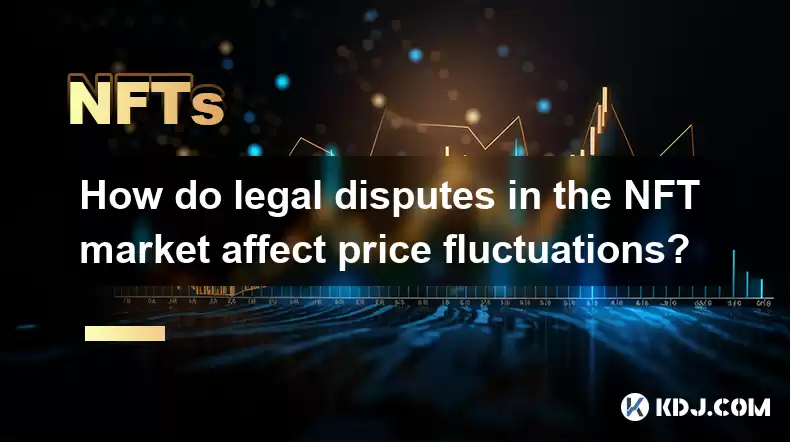
Legal disputes in the NFT market can significantly influence price fluctuations, creating a volatile environment for investors and collectors. When legal issues arise, such as disputes over intellectual property rights, ownership, or fraud, they can lead to uncertainty and fear among market participants. This uncertainty can cause rapid price drops as investors rush to sell their NFTs to avoid potential losses. Conversely, the resolution of legal disputes can restore confidence, potentially driving prices up. The impact of legal disputes on NFT prices is multifaceted, involving factors such as the nature of the dispute, the parties involved, and the broader market sentiment.
The Nature of Legal Disputes
Legal disputes in the NFT market can vary widely, but some common types include intellectual property infringement, fraud, and disputes over smart contract execution. Intellectual property disputes often arise when an NFT is created using copyrighted material without permission. These disputes can lead to lawsuits, which can scare off potential buyers and cause NFT prices to plummet. Fraudulent activities, such as selling fake NFTs or misrepresenting the ownership of an NFT, can also lead to legal action and a loss of trust in the market. Additionally, disputes over smart contract execution can arise if the terms of the contract are not met, leading to legal battles that can affect NFT prices.
Impact on Market Sentiment
Market sentiment plays a crucial role in the price fluctuations of NFTs. When legal disputes become public, they can create a negative perception of the NFT market, leading to a decrease in demand and, consequently, lower prices. Investors and collectors may become wary of investing in NFTs due to the perceived risk of legal issues. On the other hand, if a legal dispute is resolved favorably, it can boost confidence in the market, leading to increased demand and higher prices. The media coverage of legal disputes can amplify their impact on market sentiment, as widespread reporting can influence public perception and investor behavior.
Case Studies of Legal Disputes and Price Fluctuations
Several high-profile legal disputes in the NFT market have demonstrated the impact on price fluctuations. For instance, the dispute between artist Beeple and the platform Nifty Gateway over the sale of his artwork led to significant price volatility. When the dispute was made public, the prices of Beeple's NFTs dropped sharply as investors feared the potential legal repercussions. Another example is the legal battle between the creators of the CryptoKitties game and a group of investors who claimed they were misled about the project's potential. This dispute led to a decline in the value of CryptoKitties NFTs as trust in the project waned. These case studies illustrate how legal disputes can directly affect NFT prices.
The Role of Regulatory Actions
Regulatory actions can also influence legal disputes in the NFT market and, consequently, price fluctuations. Governments and regulatory bodies may intervene in the market to address issues such as fraud, money laundering, or intellectual property rights. These interventions can lead to legal disputes between regulators and market participants, creating uncertainty and affecting NFT prices. For example, if a regulatory body imposes new rules on the sale of NFTs, it can lead to legal challenges from those affected by the regulations. The outcome of these legal battles can have a significant impact on the market, either stabilizing prices or causing further volatility.
Strategies for Mitigating Legal Risks
To mitigate the impact of legal disputes on NFT prices, market participants can adopt several strategies. One approach is to conduct thorough due diligence before investing in an NFT, ensuring that the asset's ownership and intellectual property rights are clear. Another strategy is to use smart contracts that are designed to minimize the risk of disputes, such as those that include clear terms and conditions for the transfer of ownership. Additionally, market participants can stay informed about legal developments in the NFT space and adjust their investment strategies accordingly. By taking these steps, investors and collectors can reduce their exposure to legal risks and help stabilize NFT prices.
The Future of Legal Disputes in the NFT Market
As the NFT market continues to evolve, the nature and frequency of legal disputes are likely to change. New technologies and platforms may emerge that help to reduce the risk of legal issues, such as improved smart contract designs and better tools for verifying ownership and intellectual property rights. However, as the market grows, new types of disputes may also arise, requiring ongoing vigilance from market participants. The future of legal disputes in the NFT market will depend on a variety of factors, including regulatory developments, technological advancements, and the overall maturity of the market. Understanding these dynamics is crucial for predicting how legal disputes will continue to affect NFT price fluctuations.
Common Questions and Answers
What types of legal disputes are common in the NFT market?
Common legal disputes in the NFT market include intellectual property infringement, fraud, and disputes over smart contract execution. These disputes can arise when NFTs are created using copyrighted material without permission, when fraudulent activities occur, or when the terms of a smart contract are not met.How do legal disputes affect NFT prices?
Legal disputes can lead to uncertainty and fear among market participants, causing rapid price drops as investors rush to sell their NFTs. Conversely, the resolution of legal disputes can restore confidence, potentially driving prices up. The impact on prices depends on factors such as the nature of the dispute, the parties involved, and the broader market sentiment.Can regulatory actions influence legal disputes in the NFT market?
Yes, regulatory actions can influence legal disputes in the NFT market. Governments and regulatory bodies may intervene to address issues such as fraud, money laundering, or intellectual property rights, leading to legal disputes between regulators and market participants. These disputes can create uncertainty and affect NFT prices.What strategies can be used to mitigate legal risks in the NFT market?
Strategies to mitigate legal risks include conducting thorough due diligence before investing, using smart contracts designed to minimize disputes, and staying informed about legal developments in the NFT space. By taking these steps, market participants can reduce their exposure to legal risks and help stabilize NFT prices.How might the future of legal disputes in the NFT market evolve?
The future of legal disputes in the NFT market will depend on factors such as regulatory developments, technological advancements, and the overall maturity of the market. New technologies and platforms may help reduce the risk of legal issues, but new types of disputes may also arise as the market grows.
Disclaimer:info@kdj.com
The information provided is not trading advice. kdj.com does not assume any responsibility for any investments made based on the information provided in this article. Cryptocurrencies are highly volatile and it is highly recommended that you invest with caution after thorough research!
If you believe that the content used on this website infringes your copyright, please contact us immediately (info@kdj.com) and we will delete it promptly.
- Altcoin Rotation, Smart Money, and Investment Trends: What's the Deal?
- 2025-08-04 12:30:11
- Crypto, Pi Network, Movement: Is Pi Coin the Next Big Thing?
- 2025-08-04 12:30:11
- Bitcoin, Metaplanet, and Institutional Confidence: A New Era?
- 2025-08-04 12:50:12
- XRP Price, Ripple CTO, and Tokenized Finance: A New York Minute on Crypto
- 2025-08-04 12:50:12
- Pi Coin: Future Access or Early Adoption Blues?
- 2025-08-04 12:55:11
- Ethereum Liquidations Rock Crypto Market: What's a New Yorker to Do?
- 2025-08-04 13:00:17
Related knowledge
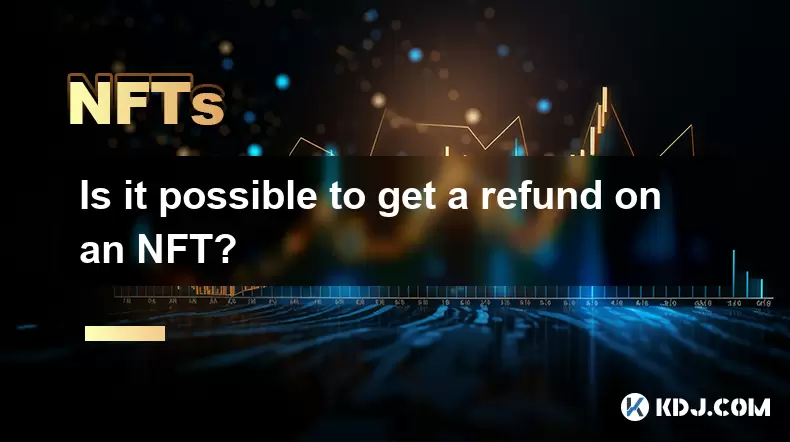
Is it possible to get a refund on an NFT?
Jul 21,2025 at 08:35pm
Understanding NFT Transactions and RefundsWhen you purchase an NFT (Non-Fungible Token), the transaction is typically recorded on a blockchain, making...
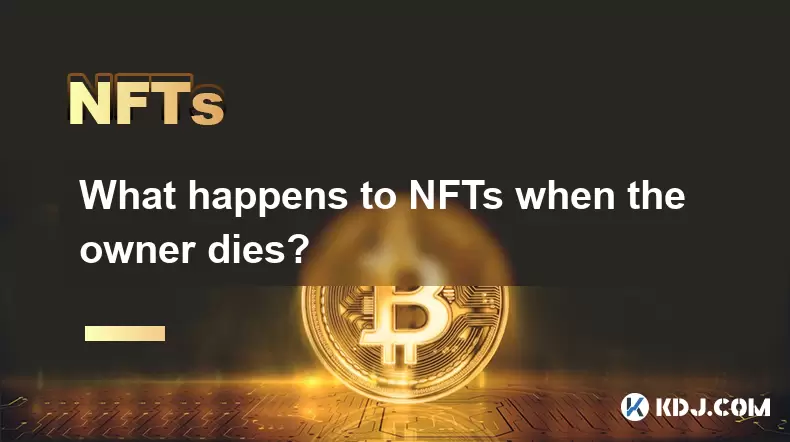
What happens to NFTs when the owner dies?
Jul 22,2025 at 02:43pm
Legal Ownership and Digital AssetsWhen an individual owns NFTs, the question of what happens to these assets upon their death is a pressing one. NFTs ...
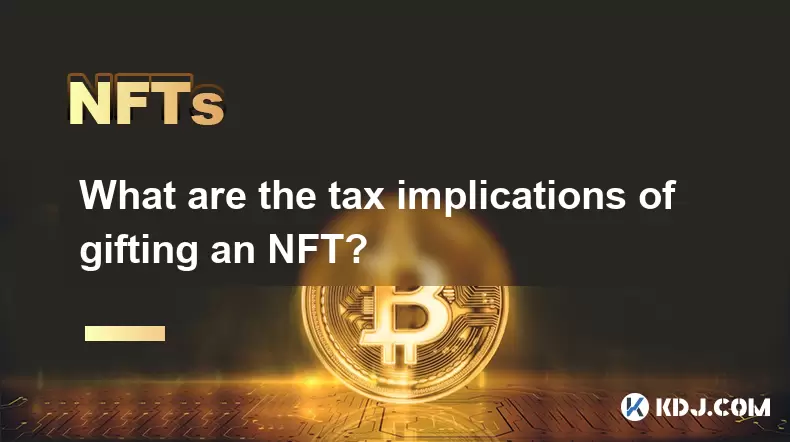
What are the tax implications of gifting an NFT?
Jul 19,2025 at 04:21am
Understanding the Basics of NFT GiftingGifting a Non-Fungible Token (NFT) involves transferring ownership from one individual to another without recei...
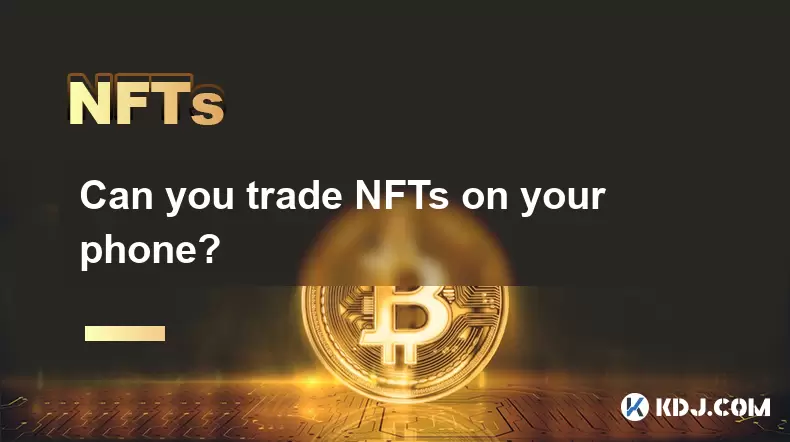
Can you trade NFTs on your phone?
Jul 18,2025 at 04:29am
Trading NFTs on Mobile DevicesYes, you can trade NFTs on your phone, and the process has become increasingly streamlined thanks to a variety of mobile...
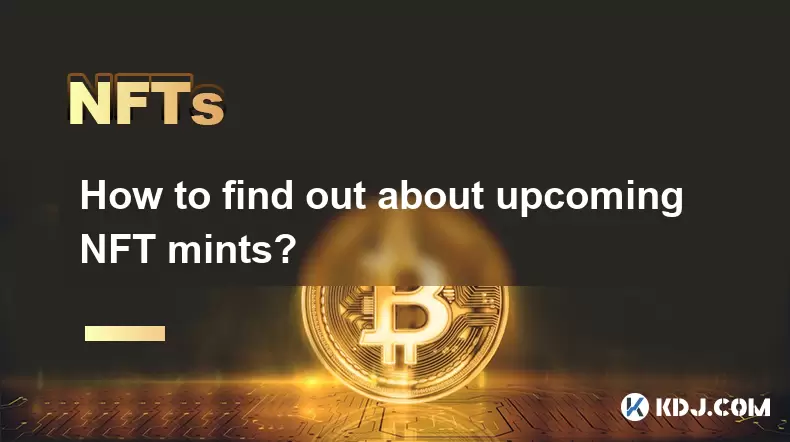
How to find out about upcoming NFT mints?
Jul 18,2025 at 11:50am
Exploring NFT Minting OpportunitiesUnderstanding the landscape of upcoming NFT mints is crucial for collectors, investors, and creators who wish to st...
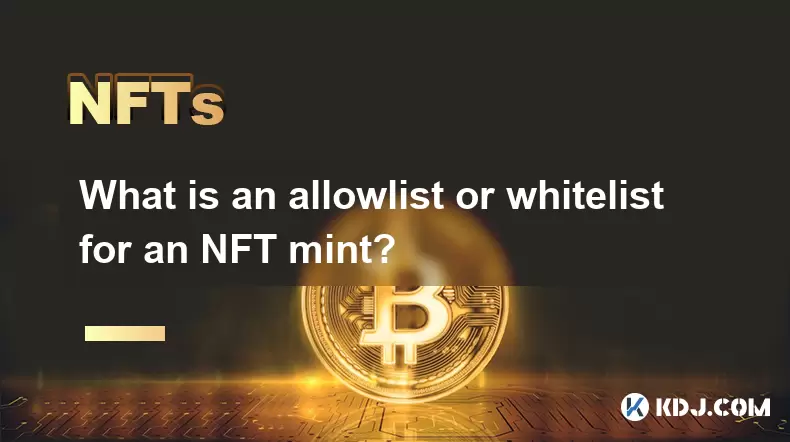
What is an allowlist or whitelist for an NFT mint?
Jul 20,2025 at 07:14pm
Understanding the Concept of an Allowlist for NFT MintingAn allowlist, also commonly referred to as a whitelist, is a mechanism used in the NFT mintin...

Is it possible to get a refund on an NFT?
Jul 21,2025 at 08:35pm
Understanding NFT Transactions and RefundsWhen you purchase an NFT (Non-Fungible Token), the transaction is typically recorded on a blockchain, making...

What happens to NFTs when the owner dies?
Jul 22,2025 at 02:43pm
Legal Ownership and Digital AssetsWhen an individual owns NFTs, the question of what happens to these assets upon their death is a pressing one. NFTs ...

What are the tax implications of gifting an NFT?
Jul 19,2025 at 04:21am
Understanding the Basics of NFT GiftingGifting a Non-Fungible Token (NFT) involves transferring ownership from one individual to another without recei...

Can you trade NFTs on your phone?
Jul 18,2025 at 04:29am
Trading NFTs on Mobile DevicesYes, you can trade NFTs on your phone, and the process has become increasingly streamlined thanks to a variety of mobile...

How to find out about upcoming NFT mints?
Jul 18,2025 at 11:50am
Exploring NFT Minting OpportunitiesUnderstanding the landscape of upcoming NFT mints is crucial for collectors, investors, and creators who wish to st...

What is an allowlist or whitelist for an NFT mint?
Jul 20,2025 at 07:14pm
Understanding the Concept of an Allowlist for NFT MintingAn allowlist, also commonly referred to as a whitelist, is a mechanism used in the NFT mintin...
See all articles

























































































